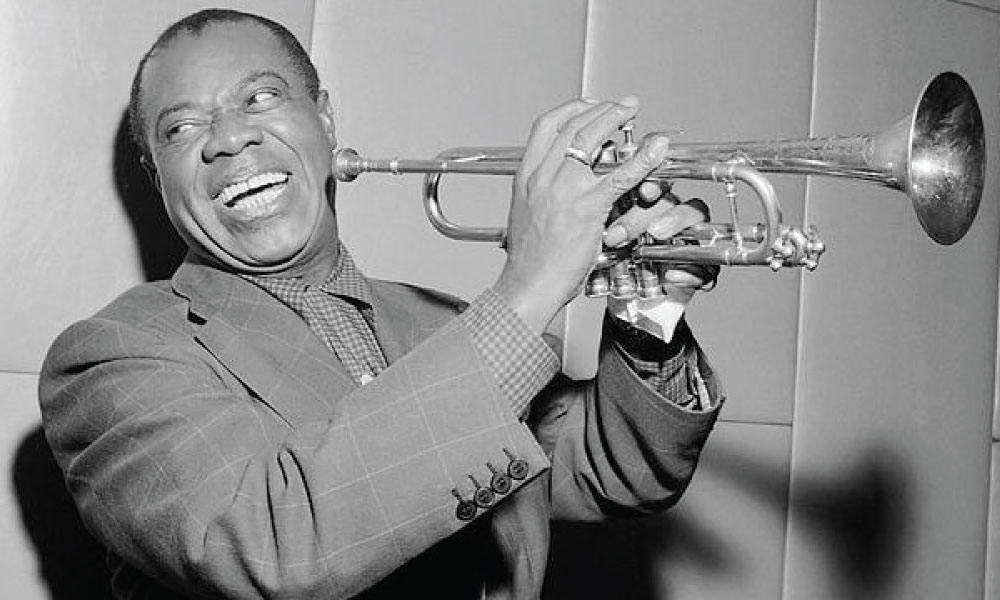Louis Armstrong, often affectionately referred to as “Satchmo” or “Pops,” is a name synonymous with the very essence of jazz. Born on August 4, 1901, in New Orleans, Louisiana, he emerged from humble beginnings to become one of the most influential and celebrated musicians of the 20th century. Armstrong’s journey through life and music is a testament to his remarkable talent, unwavering determination, and the enduring power of jazz.
Early Life and Background
A Humble Beginning
Louis Armstrong’s early life was marked by adversity. He was born into poverty in the racially segregated South, and his father abandoned the family when Louis was just an infant. Raised by his mother and grandmother, Armstrong faced the harsh realities of life in New Orleans’ impoverished neighborhoods.
The Colored Waif’s Home: A Turning Point
Despite the challenging circumstances, a turning point came when Armstrong was 11 years old. He was sent to the Colored Waif’s Home for Boys, a reform school. It was here that young Louis discovered his love for music. The home had a small band, and it was there that he was introduced to the cornet, a brass instrument that would change his life forever.
Louis Armstrong’s Musical Beginnings
The Cornet and a Lifelong Passion
Under the tutelage of Peter Davis, the music instructor at the Colored Waif’s Home, Armstrong learned to play the cornet. His innate talent and dedication to practice quickly became evident. He demonstrated a unique ability to replicate melodies and improvise, laying the foundation for his future as a jazz innovator.
Making a Name in New Orleans
As Armstrong honed his musical skills, he began playing in local jazz bands, honing his craft in the vibrant and diverse New Orleans music scene. It was here that he learned the essentials of jazz improvisation, a skill that would later define his distinctive style. His journey from playing on street corners to performing in clubs and dance halls marked the early stages of his illustrious career.
The Jazz Revolution
- The Roaring Twenties: The Jazz Age
The 1920s heralded the Jazz Age, a cultural and musical explosion that would change the course of American music history. Louis Armstrong found himself at the epicenter of this revolution, playing a pivotal role in shaping the sound of jazz. His remarkable virtuosity and innovation on the cornet and later the trumpet set him apart as a true musical pioneer.
- Joining King Oliver’s Creole Jazz Band
Armstrong’s big break came when he joined King Oliver’s Creole Jazz Band in Chicago. Oliver was a renowned cornetist, and working alongside him was a transformative experience for Armstrong. It was during this time that he developed his signature style, marked by dazzling high notes and melodic phrasing. Armstrong’s contributions to Oliver’s band were instrumental in defining the “Hot Jazz” genre.
- The Chicago Adventure with Fletcher Henderson
After his tenure with Oliver, Armstrong joined the Fletcher Henderson Orchestra, a pivotal moment in his career. This experience exposed him to a broader audience and allowed him to refine his improvisational skills further. Armstrong’s time with Henderson laid the groundwork for his future success as a bandleader and solo artist.
Career Milestones
Armstrong’s Ascent as a Bandleader
In the late 1920s, Louis Armstrong began recording as a bandleader. His recordings with the Hot Five and later the Hot Seven are legendary in the jazz world. These small ensemble recordings showcased Armstrong’s virtuosity, innovative trumpet techniques, and charismatic vocal delivery. Tracks like “West End Blues” and “Potato Head Blues” remain iconic and are considered some of the most influential jazz recordings of all time.
Jazz Classics That Defined an Era
Armstrong’s discography boasts a treasure trove of jazz classics. His expressive, gravelly voice and unique scat singing style set him apart as a vocalist. Songs like “What a Wonderful World,” “Hello, Dolly!” and “When the Saints Go Marching In” continue to resonate with audiences across generations, transcending the boundaries of time and genre.
International Stardom
- Taking Jazz Across Borders
Louis Armstrong’s impact extended far beyond American shores. He embarked on extensive global tours, introducing jazz to audiences worldwide. His performances in Europe, Asia, and Latin America broke racial barriers and garnered him international acclaim.
- Breaking Racial Barriers
Armstrong was a trailblazer in challenging racial prejudices. He used his fame to advocate for civil rights and equality, making significant contributions to the Civil Rights Movement. His music and persona helped bridge racial divides and promote unity during a turbulent era in American history.
- “What a Wonderful World” – An Evergreen Classic
Among Armstrong’s extensive discography, “What a Wonderful World” stands out as an enduring masterpiece. This timeless song’s heartfelt optimism and celebration of the beauty in the world continue to inspire and uplift people of all ages.
Legacy and Influence
Shaping the Sound of Jazz
Louis Armstrong’s impact on the world of jazz is immeasurable. His pioneering trumpet techniques, including his brilliant improvisation and scat singing, forever altered the trajectory of the genre. His influence can be heard in the works of countless jazz musicians, from Miles Davis and John Coltrane to contemporary artists like Wynton Marsalis.
Inspiring Generations of Musicians
Armstrong’s legacy transcends jazz. He inspired musicians across genres, from rock to pop and beyond. His influence can be heard in the work of artists as diverse as Elvis Presley, The Beatles, and Frank Sinatra, all of whom acknowledged Armstrong’s profound impact on their music.
In the annals of music history, few names shine as brightly as Louis Armstrong’s. His journey from a disadvantaged childhood in New Orleans to international stardom is a testament to the power of talent, dedication, and the enduring appeal of jazz. His music continues to bring joy and inspiration to people worldwide, reminding us that in a world sometimes filled with discord, there is always room for the joyous, soul-stirring sounds of Louis Armstrong. His legacy remains an everlasting testament to the beauty of music and the boundless potential of the human spirit.












